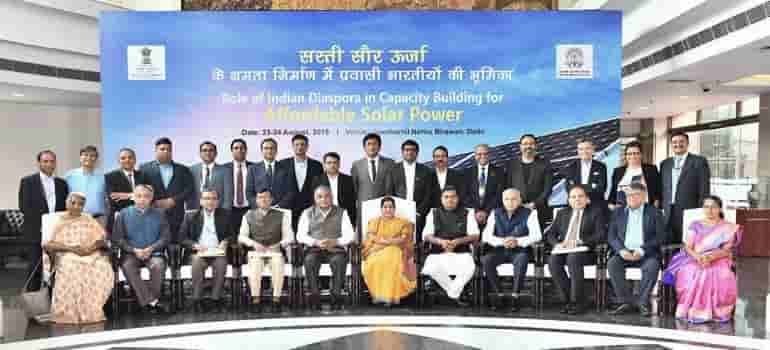
The Ministry of External Affairs, Government of India as part of its overall outreach to the Indian Diaspora regularly organizes Pravasi Bharatiya Divas conferences on specific themes. On 24th August 2018, the panelists of Pravasi Bharatiya Panel discussed on “Role of Indian Diaspora in Capacity Building for Affordable Solar Power” called on by the Prime Minister.
This included renowned experts, academicians, innovators, industrialists, and entrepreneurs from Indian diaspora and India. They presented the outcomes of their discussions over the last two days in areas such utility- scale solar, off-grid and microgrid solutions, solar storage, next- generation solar technologies and innovative financing options for the renewable sector.
India has an ambitious target of 175 GW of renewables by 2022. The key challenge for reaching these targets would be the ability of the grid to integrate variability associated with these renewables, as well as the huge investment required for upgrading the T&D infrastructure. Energy storage can help in better integration of these renewable by providing multiple values to the system such as optimizing T&D investments, addressing forecasting errors in wind and solar generation for more accurate scheduling, addressing local reliability issues by providing reactive power support and also enabling end users for managing peak load and more efficient utilization of distributed renewables etc. With the rapid reduction in the cost of both solar and storage, customers can see solar plus storage as an alternative for the peak power from the grid at the same time, utilities can avoid investments in Peaker capacity or eliminate load shedding by utilizing these resources.
In recent months various tenders on solar + storage were floated by SECI, BESCOM, NTPC, and NLC in states like Andhra Pradesh, Himachal Pradesh and Andaman & Nicobar Islands. Recently, Minister of Power Shri R.K. Singh apprised the Lok Sabha about proposed National Energy Storage Mission (NESM) with the objective to strive for leadership in energy storage sector by creating an enabling policy and regulatory framework that encourages manufacturing, deployment, innovation and further cost reduction.
Speaking on the occasion, Dr. Rahul Walawalkar, Executive Director, India Energy Storage Alliance (IESA) said, “It was a privilege to be a part of the Pravasi Bharatiya Divas conference and discussing the role of Solar and Energy Storage for India’s development. I look forward towards the launch of National Energy Storage Mission to support energy access, e-mobility & RE Integration. India Energy Storage Alliance supports the vision to make India a global hub for R&D and manufacturing of Advanced Energy Storage systems and EVs by 2022 and we’re continuously working towards it.”
